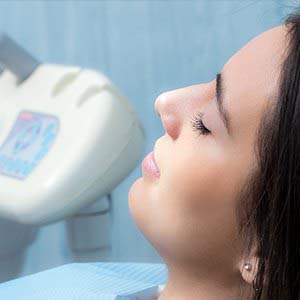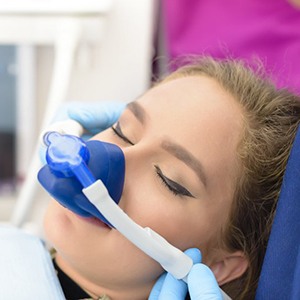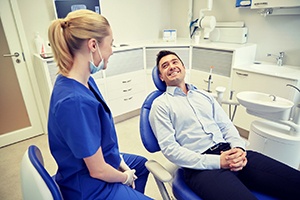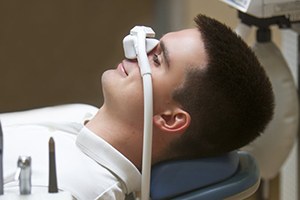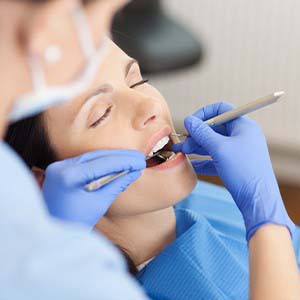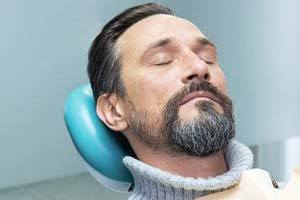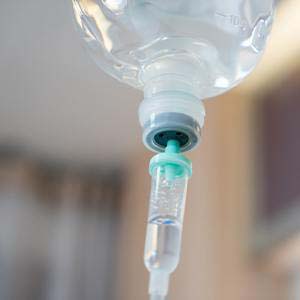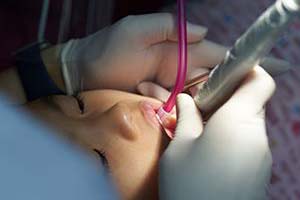Is Sedation Dentistry Safe?
When administered by a seasoned professional with years of advanced training and experience like Dr. Weinstein, Dr. Thompson, Dr. Guzman, or Dr. Chafin, sedation dentistry is extremely safe. As Diplomates of the American Dental Society of Anesthesiology, our doctors are committed to providing the safest and most effective means of dental sedation. In addition to thoroughly reviewing your medical history and determining which type of sedation is best for you, we will monitor your vital signs at all times while you are sedated to ensure your comfort and safety.
Which Type of Sedation Is Right for Me?
We’re proud to offer a wide variety of different types of sedation dentistry to ensure that everyone can get exactly what they need. Each option comes with its own advantages and considerations, and not all patients are good candidates for all types of sedation. To determine if dental sedation is right for you and which type you would benefit most from, we will see you for a consultation. We’ll go over your medical history, health conditions, and overall level of anxiety before fully explaining which types of sedation would be best for you.
Who Shouldn’t Get Sedation Dentistry?
While most patients are good candidates for sedation dentistry, there are some exceptions. There are some factors that can limit which types of sedation are a good choice for you, or if you should be sedated at all. Typically, we won’t recommend sedation dentistry for patients who:
-
Have a breathing problems such as obstructive sleep apnea
-
Are currently experiencing nasal congestion
-
Have certain medical conditions that may put them at risk of complications
Will Sedation Dentistry Put Me to Sleep?
With the exception of general anesthesia, no, sedation dentistry does not knock you unconscious. Many patients feels so relaxed and comfortable that they may doze off during their procedure, but they can be easily awoken. In most cases, you’ll remain conscious enough to respond to our questions and instructions throughout your treatment. You’ll remain conscious during your procedure, but will be oblivious to the sights, sounds, and sensations that would normally cause you anxiety or discomfort. That being said, many patients feel as though they were knocked out or asleep during their appointment because they have little to no memory of it.
Can Older Adults or Children Benefit from Dental Sedation?
Since our team of board-certified sedation dentists offers several different options to choose from, we’re proud to say that we can help almost any patient find a method that works best for them. Even children and older adults who are anxious or uncomfortable can likely benefit from dental sedation as long as they are in good health. For these cases, nitrous oxide is often the safest and most effective, as it is the lightest form of sedation and the effects wear off quickly. During your consultation, we’ll take into account a wide variety of factors to determine which option would work best for your loved one.
Is Sedation Dentistry Safe While Pregnant or Breastfeeding?
Generally, sedation dentistry is not recommended for patients who are pregnant. If at all possible, it’s best to avoid dental sedation while pregnant and postpone your treatment until after giving birth. However, professionals agree that sometimes dental sedation is necessary to address serious oral health issues that could influence the health of your baby. For these situations, it is often best to use sedation dentistry in the second trimester and to use lighter forms of sedation, such as nitrous oxide sedation or oral conscious sedation. Sedation dentistry is very safe for woman who are breastfeeding since there’s an extremely low chance that the medications will affect breast milk.
Can You Still Feel Pain with Sedation Dentistry?
With general anesthesia, you won’t feel any pain or sensation during your treatment as you’ll be unconscious. However, even though all other forms of dental sedation keep you conscious and are not necessarily pain relievers, you are unlikely to feel any discomfort or pain with their help. Sedation dull the body’s senses and inhibits the ability to register pain. So while you may feel slight sensations or pressure in your mouth as we work, it is very unlikely that you will feel anything that comes close to pain.
What Does Dental Sedation Feel Like?
Naturally, experiences vary from patient to patient and method to method. Generally, patients who opt for nitrous oxide sedation report feeling light, weightless, and warm. They often also feel happy and perhaps even giggly, which is where it earns its nickname laughing gas. On the other hand, oral conscious sedation and IV sedation cause a deeper level of relaxation, often accompanied by a heavy feeling in the limbs and grogginess. Each option is so relaxing that patients sometimes drift off to sleep during their treatment, but can be easily awoken with a gentle shake when needed.
How Long Does It Take to Recover from Sedation Dentistry?
Recovery time differs between sedation options. With nitrous oxide sedation, the medication and the effects will both completely leave your system within a few minutes of having the mask over your nose removed. You’ll return to your natural level of consciousness and should even be well enough to drive yourself home and continue on with the rest of your day uninterrupted. The effects of oral conscious sedation come on slowly and wear off gradually, so you should plan on feeling sleepy and groggy for several hours after your appointment. As the most powerful form of dental sedation, IV sedation often reuiqres that patients relax for the remainder of their day after treatment as the effects wear off.
Will I remember the treatment after dental sedation?
Even though you are technically awake with most forms of sedation, chances are that you won’t remember much of your treatment. IV sedation is more likely to make you forget your procedure than oral conscious sedation or nitrous oxide. The memory loss effect that sedation has can make getting dental care much easier for patients with extreme dental anxiety and phobia.
Can dental sedation make me sick?
It is quite rare to feel nauseous with nitrous oxide sedation. Because oral conscious sedation is stronger than nitrous oxide, there is a slightly higher risk of nausea. Just to be safe, your dentist will likely recommend that you don’t eat for a few hours before your procedure. If you have trouble skipping meals, you may want to schedule your appointment in the early morning. IV sedation has an elevated risk of nausea due to its stronger effects. If you are prone to feeling nauseous, simply let your dentist know and they can adjust accordingly.
What are the risks with sedation dentistry?
Even though sedation dentistry in Jupiter is safe for most patients, it can still present risks for some people. Those with obstructive sleep apnea or who are taking certain medications might be more likely to experience complications with sedation. Also, keep in mind that everyone reacts differently to sedatives and the medications that are used during a dental procedure. It’s completely normal to experience a few side effects after being sedated, such as nausea, headache, and grogginess. They may last for several hours following the procedure.
Is sedation dentistry covered by insurance?
Since sedation dentistry is considered a “luxury,” it’s typically not covered by dental insurance providers. Of course, there are some exceptions. If the procedure is especially complex or you have a disability that makes it impossible to receive the necessary care you need without it, then coverage may be available. If you aren’t familiar with your benefits, that’s okay. Our team would be more than happy to help you navigate your plan and understand the cost completely.
Am I a good candidate for sedation dentistry?
If you experience dread or severe anxiety at the idea of going to the dentist’s office, you might benefit from sedation dentistry. Putting off oral care due to fear will only allow minor issues to worsen and become serious problems. You might also be a good candidate if you have low pain tolerance, a sensitive gag reflex, or difficulties sitting still or holding your mouth open for prolonged periods. If you’d like to get extensive dental work done in one visit, dental sedation can make for a more comfortable experience. Your dentist will go over your medical history and list of medications beforehand to find out if sedation is right for you.





